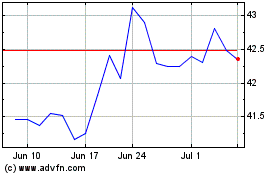By David Benoit, Alison Sider and Liz Hoffman
A new fight is brewing over control of pipeline giant Williams
Cos. after a dramatic boardroom schism over the Tulsa, Okla.,
company's leadership this week led to six directors quitting.
The resignations -- nearly half the 13-member board -- came as
the board debated what the next steps for the company would be
following the collapse of its sale to Energy Transfer Equity LP of
Dallas. But the split has deep roots that predate the failed $33
billion deal, people familiar with the matter said.
The six-member bloc that resigned, which included Chairman Frank
MacInnis, fought against keeping Alan Armstrong at the helm as
chief executive as Williams prepares to set a new course and
contemplates its future as an independent company. Many energy
firms have struggled as low fuel prices have shut down new U.S.
drilling and production.
Two of the departing board members, activist investor Keith
Meister of Corvex Management LP and Eric Mandelblatt of Soroban
Capital Partners, on Friday disclosed their resignation letters,
which blasted Mr. Armstrong as well as the remaining board.
The pair, who strongly favored merging with rival oil-and-gas
pipeline operator Energy Transfer, indicated they wouldn't sell
their stock and leave quietly, which could set the stage for a
proxy fight to remove the rest of the board.
"Ironically, given the current CEO and board leadership, I
believe I will be more effective from outside the company than
within, and will seek to protect our interests and the interest of
other shareholders from outside this diminished boardroom," Mr.
Meister wrote.
Mr. Mandelblatt closed his letter with "I retain all options
going forward to protect shareholders from further value
destruction."
Shares of Williams fell 5% to $20.56 Friday.
The board determined Mr. Armstrong was the best person to lead
the company going forward and Mr. MacInnis left his post as
chairman for personal reasons, the company said in a statement.
"The board of directors has thoroughly evaluated the company's
leadership structure and determined that Alan Armstrong is the
right chief executive officer for Williams as the company works to
continue enhancing stockholder value," the company said. "The board
and management look forward to speaking with stockholders in the
coming weeks to hear their views and outline the Company's
strategic plan for the future."
It is unclear when the board will face an election. Williams
didn't hold an annual meeting this year, because it expected the
merger with Energy Transfer to close, but a shareholder could file
a lawsuit demanding one be held. Shareholders also have the ability
to act outside of an annual meeting by a process called written
consent, which involves collecting ballots outside of an actual
meeting.
Williams said only that it would "evaluate the appropriate size
and composition of the board."
The future of Williams, which operates natural-gas pipelines
around the country, is unclear after a protracted, troubled merger
proposal from Energy Transfer went sideways. But the split, brought
into the open after the plan to sell to Energy Transfer collapsed,
traces back several years, people familiar with the matter
said.
Mr. Mandelblatt's Soroban Capital, which isn't typically an
activist investing firm, first took a stake in Williams in late
2011; Mr. Meister's Corvex Capital bought in early 2012. At the
time, neither were calling for change, but in late 2013 they teamed
up and disclosed they were seeking board seats.
The duo believed Mr. Armstrong and management struggled with
operational issues and lacked the expertise to fix them, according
to people familiar with the matter. Williams took on an ambitious
slate of acquisitions and large-scale projects under Mr.
Armstrong's leadership, but sometimes had to write down the value
of deals, missed financial targets or ran into safety problems.
Darren Horowitz, an analyst with Raymond James, said Williams's
assets, including its network of pipelines and gas processing
plants in the northeastern U.S. and the 10,000-mile Transco line
that moves natural gas from Texas to the Atlantic Coast, have few
rivals.
"That, to me, is an asset system that can't be replicated," he
said. "The outlook of Williams today is very, very different and in
my view more positive than some of the historical operations."
Still, Williams has been hurt this year as many of its customers
wrestled with low oil and gas prices.
As the price of oil collapsed, Energy Transfer tried to back out
of the Williams deal that it pursued for much of last year.
Last week, a Delaware judge ruled that Energy Transfer could
walk away and the company notified Williams this week that it
wouldn't close the deal. Williams is appealing the court's
decision.
Trial testimony showed some Williams directors viewed Messrs.
Mandelblatt and Meister warily, calling them overbearing and
brusque. One said Mr. Mandelblatt had "social skills [that] were
somewhat less developed" than those of other directors.
At least one director, Kathleen Cooper, who was among those
supporting Mr. Armstrong in Thursday's meeting, said in a
deposition that she felt threatened the activists might seek to
oust the entire board if Williams didn't agree to the Energy
Transfer deal. A lawyer for Williams testified the company hadn't
received any threats of a campaign.
Ms. Cooper was appointed chairman Friday.
Write to David Benoit at david.benoit@wsj.com, Alison Sider at
alison.sider@wsj.com and Liz Hoffman at liz.hoffman@wsj.com
(END) Dow Jones Newswires
July 02, 2016 02:48 ET (06:48 GMT)
Copyright (c) 2016 Dow Jones & Company, Inc.
Williams Companies (NYSE:WMB)
Historical Stock Chart
From Mar 2024 to Apr 2024

Williams Companies (NYSE:WMB)
Historical Stock Chart
From Apr 2023 to Apr 2024
